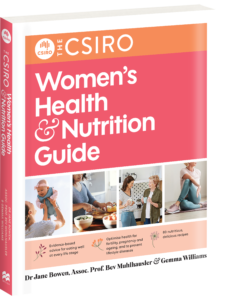If you’ve entered peri-menopause then you might be finding life a bit more challenging than usual. Peri-menopause is a phase that leads up to menopause where you may start to notice physical and psychological changes in your body like lighter or less regular periods.
Some people experience many debilitating symptoms, some breeze through with very mild signs that things are changing inside. For most, this starts between the ages of 45 and 55. But it can be earlier or later.
Common menopause symptoms include hot flushes, night sweats, muscle aches, dry skin, dry vagina, lower sex-drive and sleeping difficulties. Some may also experience mood changes, anxiety, irritability, forgetfulness and have difficulty concentrating or making decisions. Think of it as ‘undoing’ puberty.
Can’t wait, right? The good news is that some specific food groups and nutrients are beneficial during and after menopause.
Does what we eat help reduce symptoms?
Fruit and vegetables
Fruit and vegetables are packed with fibre and antioxidants. Regular fruit and vegetable consumption has been shown to help reduce hot flushes in some people.
Omega-3-fats
Omega-3 fats can relieve some of the symptoms of menopause. Aim to eat fish (or other sources of these healthy fats) around three times a week.
Low-GI foods
Low-GI foods help lower blood sugar levels which can reduce the severity of hot flushes. Switch from white and refined to wholegrain and wholemeal breads, pasta, and rice.
Phytoestrogens
Phytoestrogens (or plant oestrogens) are naturally found in some plants and soy based foods. Despite some early controversy, current research shows they are a healthy choice, particularly for women because they have a modest capacity to copy some of our body’s own oestrogen functions. This may be helpful because our levels of oestrogen naturally decline around the time of menopause.
Dairy foods
Dairy food and calcium fortified alternatives provide calcium to help promote bone health. These foods are especially important during and after menopause.
Did you know our muscle mass declines with age?
Eating foods that are high in protein is important to maintain muscle mass as we age. Aim to include protein rich foods at every meal. Animal-based sources such as lean meats, eggs and dairy are highest in protein, but there are plenty of plant-based protein options such as beans, legumes, tofu, nuts and seeds. Combine protein rich foods with resistance exercise to help maintain muscle mass for strength, posture, and balance.
Are there foods to avoid?
Caffeine and alcohol can be big two contributors to hot flushes for some. These stimulants also disrupt sleep, so avoid these or have them occasionally if sleeping is problematic for you.
Will my body shape change?

Your body shape may change around this stage of life. This could be due to a few reasons, not just menopause. They include:
- Exercising less in our 40s and 50s.
- Tending to have less structured eating habits when retired or working less.
- Drinking more alcohol as we get older.
- Lower oestrogen levels after menopause which promote fat storage around the waist.
What are the most important lifestyle choices for those going through menopause?
According to co-author Gemma Williams, the best approach to help you through menopause is to make some simple, evidence-based lifestyle choices that become habitual.
Ditch the fads and enjoy eating nourishing, fresh foods. Aim to eat mostly from the core food groups, avoid too much in the way of sugary foods, caffeine and alcohol, and commit to moving your body every day.
The CSIRO Women’s Health & Nutrition Guide has been written by women for women. It gives you the facts on foods to eat throughout every life stage, including menopause.
